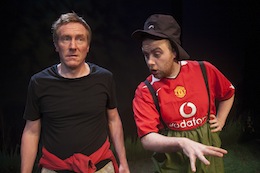Whilst on a fishing trip to Croatia, that serves to distract from their problems at home in Dublin, Pauly (Ciarán Kenny) and Jacko (Aidan Crowe) are strolling through a field, when Pauly hears a click. Fearing he has just tread on a defective land-mine, left over from the Croatian-Bosnian war, Pauly refuses to move an inch and pleads with his ‘side-kick’ Jacko for comfort and rescue. Waiting for help, the situation allows for the two men to reveal secrets about each other and to learn some truths about themselves. Much to the delight of the audience, it also provides these cheeky Dublin characters with the opportunity to crack as many gags as they can to lighten their mood and divert them from thoughts of their tricky, indeed, ‘clicky’ predicament.
.jpg.aspx%3Fwidth=260&height=184) Michael Collier’s debut play is a tightly constructed two-hander that exploits its novel dramatic situation to full comic effect. Click is exemplary of classical constructions of drama. We have a situation with high stakes, conflicts between characters on how to deal with such circumstance; a diurnal progression of time in which secrets come out, and, as we move to a final resolution of conflicts, the two men gain some insight which affects a transformation in their characters. Interestingly, as these two men are trapped on stage and waiting for a rescue party that never arrive the piece is also redolent of Beckett’s anti-drama Waiting for Godot. Such attention to form benefits the piece ensuring that the action never lags and that tension created from the opening moment is sustained to the last sudden movement of the play.
Michael Collier’s debut play is a tightly constructed two-hander that exploits its novel dramatic situation to full comic effect. Click is exemplary of classical constructions of drama. We have a situation with high stakes, conflicts between characters on how to deal with such circumstance; a diurnal progression of time in which secrets come out, and, as we move to a final resolution of conflicts, the two men gain some insight which affects a transformation in their characters. Interestingly, as these two men are trapped on stage and waiting for a rescue party that never arrive the piece is also redolent of Beckett’s anti-drama Waiting for Godot. Such attention to form benefits the piece ensuring that the action never lags and that tension created from the opening moment is sustained to the last sudden movement of the play.
Caroline FitzGerald as director makes certain that the actors are very sensitive to the changing rhythms of the play as we move repeatedly from the jocular to the tragic and back. In a play where one character is placed standing centre stage the director must strike a nice balance with the other character’s movements guaranteeing they are never too static and uninteresting or overly dynamic, fussy and distracting. FitzGerald achieves this in her seamless staging.
Phillipa Kavanagh’s representational set creates a sense of place by hinting at the expanse of the grassy mine-field in covering the stage area with artificial-grass material and cardboard cut-out weeds. Nell Conneally’s lighting plan served to chart the progression of time with effective variants of colour and intensity giving a sense of the afternoon turning into evening and then into early morning as the plot demands. The passage of time was also marked through a simple fade down and up of the lights that worked well to punctuate the comic episodes, similar to the practices of early film makers.
 Despite being limited in his movements by having to stay rooted to the spot where he has supposedly stood on the land-mine, Kenny as Pauly overcomes such restrictions to give an assured, witty and sympathetic performance clearly conveying his character’s frustration and exhaustion both with humour and pathos.
Despite being limited in his movements by having to stay rooted to the spot where he has supposedly stood on the land-mine, Kenny as Pauly overcomes such restrictions to give an assured, witty and sympathetic performance clearly conveying his character’s frustration and exhaustion both with humour and pathos.
If these two men are a double act then Pauly is the straight man (literally in this case) while Jacko is the fool. Although as the plot unfurls such assigned roles are played with and challenged. Crowe contrasts Kenny’s stasis as Pauly with his physical portrayal of Jacko. He shuffles about the stage as an ungainly figure in ridiculously large fishing trousers causing the audience to giggle from his first entrance. Like Kenny, Crowe also makes us care for Jacko in his charming and sensitive interpretation of this role.
Unfortunately, a simple pairing of two Dublin working class men in comical repartee is nothing new and has been overdone on stage, film and television. It demands a new twist or invention which is lacking here. Although the actors do well to flesh out these characters, the behaviour and world of Pauly and Jacko feels simplistic and overly familiar. A sense of the Dublin and indeed Ireland that has shaped these characters is never properly situated in terms of culture or history and thus they are reduced to caricature, rendered as a poor pastiche of Sean O’Casey’s tenement dwellers and the inhabitants of Roddy Doyle’s Barrytown.
That said, overall this an accomplished production that was well acted, confidently directed and demonstrated Collier’s potential as a playwright with his good understanding of form and his clear ability to make an audience laugh.
Dr. Ian R. Walsh is a lecturer in Drama in UCD and has recently published his first book, Experimental Irish Theatre, After W.B Yeats.